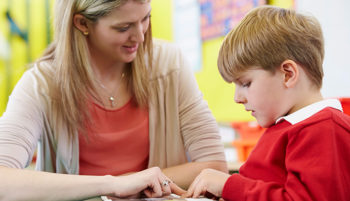Beyond Backpacks: Setting Up for School Success (Part 2)
 Beyond Backpacks: Setting Up for School Success (Part 2)
Beyond Backpacks: Setting Up for School Success (Part 2)
As summer starts to wrap up and the back-to-school excitement kicks in, most of us are thinking about new backpacks, fresh school supplies, and meeting this year’s teacher. Those things matter—but there’s something even more important that often gets missed: executive function skills. These behind-the-scenes brain skills are what really help kids start the year strong, no matter what grade they’re in. In my last blog, I described how parents can help their children establish routines, get organized, and make time tangible. This blog explains how parents can help their children become more flexible, manage impulses, and develop a working memory.
Flexible Thinking & Problem Solving: Embracing the Unexpected
School life rarely goes exactly as planned. Cultivating flexible thinking helps children adapt.
- Brainstorming Solutions: When a problem arises (“I forgot my lunch!”, “I don’t understand this math problem!”), resist the urge to immediately solve it for them. Instead, ask, “What are some ways we could solve this?” or “What’s your plan B?”
- Role-Playing Scenarios: Practice different social situations or academic challenges through role-playing. “What would you do if you finished your work early?” or “How would you ask for help if you’re stuck?”
- Emphasize Learning from Mistakes: Reframe mistakes as opportunities for growth. “That didn’t work out as you planned. What did you learn from it? What could you try differently next time?”
Sustained Attention & Impulse Control: Fostering Focus
In an increasingly distracting world, the ability to focus is paramount.
- Minimize Distractions: During homework time, create a low-distraction environment. Turn off TVs, put away phones, and limit background noise.
- “First/Then” Statements: For younger children, “First, finish your reading, then you can have screen time.” This helps them understand expectations and build perseverance.
- Mindfulness Exercises: Simple mindfulness activities (like focusing on breath for a minute or doing a quick body scan) can help children learn to regulate their attention and emotions.
- Delayed Gratification: Practice waiting for desired outcomes. This could be waiting for dessert or saving up for a toy. These small acts build impulse control over time.
Working Memory: Remembering and Applying Information
Working memory is about holding information in mind to use it for a task.
- Active Recall: Instead of just re-reading notes, encourage your child to explain concepts in their own words or quiz them on material.
- Visual Aids: Use graphic organizers, mind maps, or drawings to help children visualize and connect information.
- Break Down Instructions: Give instructions in smaller chunks. For multi-step directions, have your child repeat them back to you to ensure understanding.
- Games that Boost Memory: Incorporate games like “Simon Says,” “Memory,” or “I Spy” to playfully strengthen working memory.
Remember, building executive function skills isn’t a one-and-done deal—it’s a journey that grows over time with practice and patience. Involve your child in the process whenever you can. Let them help craft their routines, test out different ways to stay organized, and come up with creative solutions when things don’t go as planned. When kids feel ownership, they’re far more likely to stick with the strategies that work for them.
These skills aren’t just for school—they’re for life. By starting now, you’re giving your child a head start on navigating challenges, staying focused, and becoming a confident, independent problem-solver in an ever-changing world. So here’s to progress, partnership, and a fantastic school year ahead!